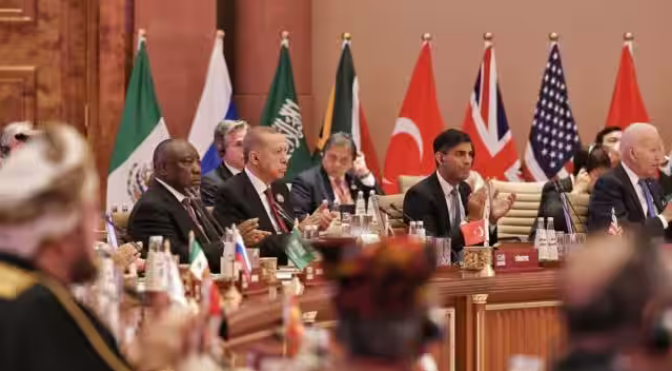
The inclusion of the African Union in G20 is an achievement of India’s Presidency and reflects its commitment to the developmental agenda of the Global South
The G20 summit attracted attention as it started with a clear consensus to invite the African Union (AU) as its member. The action-oriented ambience saw President Azali Assoumani of Comoros, the chairperson of the AU, take his seat among the G20 members. This was a unique reordering of the global high table.
By insulating the G20 as best as possible from the vagaries of big-power rivalry, India guided the agenda to the Global South and its priorities. The inclusion of the AU, at par with the European Union, was unique.
Of the AU’s 55 members, 54 are in the United Nations. Only one African country, South Africa, has been an original member of the G20. No presidency ever risked amending the membership for fear of competing rivalries. It has been India’s case that not only must the G20 reflect the priorities of the Global South, but must include those who are underrepresented, particularly from Africa. The AU has double the number of countries than the EU.
The AU has been invited to G20 meetings and some presidencies have held African outreach events in a manner of telling them what is good for them. It is India that has actually taken the initiative of talking with them rather than at them.
India aspires to bring the Global South to the centre of the G20 agenda. The elevation of the AU is courageous: no presidency has attempted to alter the composition for fear of claims from other regional organisations. The AU fits in with the rebranding of the G20 that India undertook. This is India’s harambee (Swahili word for “co-operation”) factor — the spirit of developmental cooperation in action.
The AU is the largest of regional institutions and the one with a limited voice in most international fora, despite having 54 votes in the United Nations General Assembly. The prospects of Africa getting a permanent seat in the UN Security Council remain distant. What India has achieved, as always, is to provide Africa with a voice at the high table.
This has been India’s consistent effort since the Bandung Conference in 1955, the Non-Aligned Movement (NAM) in 1961, and at various fora thereon. The inclusion of the AU in the G20 required building a consensus among countries that are deeply divided at present over the Ukraine crisis, and also on issues like reforms of the multilateral development banks (MDBs), the climate finance commitments and the like, all of which impact the Global South, particularly Africa. This is special too, because while Bandung and NAM were conferences of the South, the G20 is a global forum.
The AU formally approached India in 2022 when President Macky Sall of Senegal was its chair, to include the AU as a permanent member. In February 2023, at the AU summit, a resolution was passed to pursue AU’s ambition in the UN Security Council and at the G20. At the G20 in Bali, Sall directly sought PM Modi’s commitment, which was given. At the BRICS summit in Johannesburg in August, Sall thanked Modi for his efforts but was unsure if they would succeed. India ventured to respond to this African aspiration fully. This comes in a year that marked the 60th anniversary of the Organisation of African Unity and the AU turning 21 and coming of age.
Most G20 countries had announced individual support to the AU but were now called upon to actually walk the talk. Some countries, particularly in the east, did not have clear positions on the AU because they are not engaged with the AU to the extent that India or other partners are. Their response was slow, and, in some cases, more bureaucratic and process driven, rather than recognising Africa’s aspiration for a voice at the highest table, which ought to have been reason enough. Most thought that the decision was likely in Delhi and the AU could well sit among the G20 in Brazil. But, to the astonishment of most, the AU was admitted and seated at the start of the G20 in New Delhi as the consensus was hastened and finally implemented.
Besides the AU initiative, India invited more African countries as its guests. Of the nine guest countries, three were African — Nigeria, Egypt, and Mauritius. In addition, Comoros was here as the chair of the African Union — a G20 guest on arrival, a member on departure. Inviting Nigeria, particularly at this stage, recognises it as the largest economy in Africa, a consistent friend of India. This is Nigeria’s biggest outing since President Bola Ahmed Tinubu was elected. Nigeria was qualified to be in BRICS but perhaps did not pursue it hard enough. Nigeria participated with great enthusiasm, with a number of ministers accompanying their President in advance of the G20 Summit.
Egypt is another African powerhouse, representing North Africa. It is also the current chair of the AU-NEPAD, which is a permanent invitee to G20. Egypt is a recent strategic partner of India. India backed it to join BRICs. Egypt brings a balance to the presence of South Africa and Nigeria. Mauritius is a close friend of India due to its PIO population, its regular engagement with India, besides its strategic location in the Indian Ocean. Comoros is another Indian Ocean country representing Eastern Africa. With their participation, India ensured two of the four African countries in the Indian Ocean and most of the regions of Africa were represented, making the G20 better balanced.
Now, and in the future, this will alter the balance of the G20 towards developmental priorities and make the G7 and China fulfil their often unkept promises.
___
The writer is former ambassador to Germany, Indonesia & ASEAN, Ethiopia and the African Union
